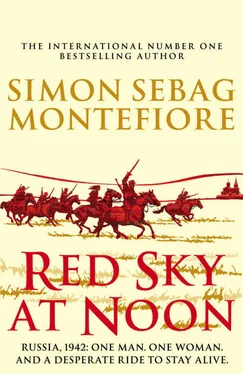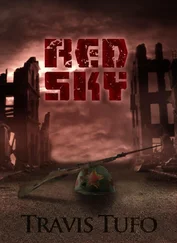That evening Benya saw Shishkov sitting in the frozen garbage heap behind the dining block sucking on a herring bone.
‘He’s a goner, a dokhodayaga, ’ said Smiley, Benya’s friend who had saved his life on the voyage to Kolyma, and who now resided in the most comfortable barracks with some of his Criminal brethren. The ‘garbage-eaters’ were not long for the world of the living.
Two weeks into winter, Shishkov fainted while pushing the wheelbarrow, spilling the rocks.
‘Pick up those fucking rocks, cocksucker,’ cried one guard, a Mongolian like many of them. ‘Get working or we’ll shoot you,’ called another guard from the rim of the great hole.
Benya pulled him up, and collected his spilled rocks. ‘Come on,’ he said. ‘They’ll shoot you! I’ll do your work today.’ It was snowing heavily. The rocks, the wheelbarrow: everything was frozen.
A couple of hours later, Shishkov again lost his balance and fell off the planks into the muddy hole. Benya climbed down but the guards shouted: ‘Get working! Leave the goner down there!’
He could see Shishkov was dying. ‘When you get out,’ he gasped, ‘go see my wife and children. Tell them…’
Benya had memorized their address and understood. He was just leaning over his friend to tell him this when he was struck on the shoulder: ‘Get to work or it’ll be the Isolator for you!’ shouted one of the Mongolian guards.
Benya took his wheelbarrow up to the conveyor hut but when he wheeled it back, the Zeks were down with Shishkov, stripping him of coat, hat, boots, trousers – everything, until there was nothing else to steal. ‘Man is wolf to man’ echoed in Benya’s ears. Never was this truer than in the Gulags.
Shishkov lay there with his eyes open, stark naked, angular and sunken, less like a man than an old ironing-board, already covered by a delicate sprinkling of snow. Twice he blinked.
‘He’s alive,’ cried Benya but the Zek next to him stopped him.
‘No, he’s gone,’ said Melishko. Respected by all in the Zone, Melishko was known as the General, and was one of the soldiers arrested in 1937. ‘And you mustn’t join him. How can we survive? Live just in the present, not the past, not the future, live minute by minute.’
No one picked up Shishkov. The next day, he was just a shape in the snow, frozen solid in his crusty tomb. By the following day, he’d vanished into the polar landscape. Could men just vanish like this? Benya learned the answer in the first days of spring. When the thaw came, and the streams were seething with fresh water which rushed through new tunnels under the muddy carapace of winter, the ice revealed its first flowers, the ‘snowdrops’, of spring – and amazingly while all the Zeks in the brigades looked ten years older, these corpses were the same age they had been when they fell.
Benya had survived almost the entire winter but in its last days of almost eternal darkness, just when veterans said spring was coming at any moment, he began to weaken. Melishko, who was older than him but much tougher, was now his partner on the wheelbarrow. As the days became longer, Benya ached with hunger. He felt his legs get heavier, and he knew he was sinking. He experienced a strange weightlessness, like a speck of dust in the wind. Would he last the next day? Or the next? he wondered. Then came a day he could barely move.
‘That’s enough,’ said Melishko. ‘I’ll talk to the brigadier. You need to stay in barracks for a day.’
But by the following day, Benya was too ill to get out of bed. His temperature was raging, and he was hallucinating, images darting at him. There was his father, in his three-piece suit and watch chain, seeing patients in the waiting room of the surgery that was the basement of their house.
Then he was with Sashenka again; she was right there with him, her Greek profile so noble it took his breath away every time. He saw the slant of her cheekbones, could even smell her scent, touch her skin. Tears ran down his face. ‘Darling,’ he said. ‘I knew you were alive.’
Floating back to his parents, to his childhood home in Lemberg when that city was part of Habsburg Galicia, long before the Revolution, and he was in school uniform and his father was saying, ‘Work harder at school or if you’re not careful, Benochka, you’ll turn into a true Galitzianer skirt-chaser…’
‘I think that’s enough, Zakhary.’ His mother was at the door. ‘I think Benochka’s got the message. Come on, you two, we’ve got a feast! It’s supper!’ It was always a feast in the Golden house. He longed to hug his parents before he died – which was when he knew he was dying…
When Benya awoke, he realized there was no God but there was a doctor, who had a stethoscope around his neck, a white coat, a notebook, a doctor who was smiling down at him.
‘There you are!’ said the doctor as if he had been waiting a long time. ‘You must drink. We’ll feed you very carefully. Temperature normal this morning. You’re very weak but you’ll be all right.’
Benya looked around at what he assumed to be a hospital ward. The sheets were white, and there was the smell of disinfectant but without its antidotes, sweat and faeces. The wooden floor was clean. Was this Moscow? Had he escaped the Zone?
‘Where am I?’
‘You’re still in Madyak, I’m afraid. You’re in my so-called clinic. I’m visiting from the hospital at Magadan. It’s simple, just this little room in a hut… We do our best. And you were lucky I was visiting this week.’
‘Are you…?’
‘Yes, I am Dr Kapto.’
‘So you’re the Baby Doctor,’ murmured Benya.
Dr Kapto was the hero of the Zone, beloved by the prisoners, the last evidence that humanity itself had not died on earth. A Zek himself of course, a veteran of many years serving a long sentence (he was surely a Political, Benya surmised), his acts of kindness were recited by the prisoners almost in nursery rhymes: how he had saved the lives of so many women who were pregnant or had been impregnated by gang-rapists or the guards; how he had delivered their babies and protected the women, refusing to let them return to work until they were strong, and how he tried to find them easy jobs thereafter. He was also rumoured to raise the children in the Zone’s own orphanage at Elgen, playing father, teacher and doctor to them. Benya thought he had never loved anyone more than this doctor at this moment. So here he was: the Baby Doctor.
‘You’re safe here, Golden,’ he said. ‘I am looking after you.’
Benya looked up into his heart-shaped face and his wonderfully light eyes, and sobs of gratitude overcame him, and he reached up to Kapto to try and hold his hands.
‘Easy, now, easy,’ Kapto said with an all-encompassing breeziness. ‘You’re depleted. We’ve got soup for you and bread. We’re going to feed you up. Ahh… you see?’
As if by magic, a short peasant girl with a flat face and heavy-lidded eyes wheeled in a trolley. The smell of food was dizzying. Benya gulped down the beet soup, the oatmeal with shredded whalemeat, the bread, the tea. He ate the butter on its own, rubbing it into his gums. He saved up the two sugar lumps and crunched them between his teeth, then let them melt on his tongue, the sensation making him shiver.
Kapto stayed with him, delighted by the sight of Benya’s recovery.
‘Who brought me in?’
‘Melishko checked on you in your barracks and dragged you over here. A few more days here and you’ll be strong.’ He stood up. ‘Now I must see to the other patients…’
Benya suddenly noticed that he was in a full ward. Other patients, some little more than living corpses of indeterminate age, were staring into the space, toothless mouths agape. As Kapto turned away, the fear returned. The nightmare was not over. They were restoring him just to kill him. He was going back to the work brigades. He could not do that. He would die out there! He leaned forward and grabbed Kapto’s coat.
Читать дальше












